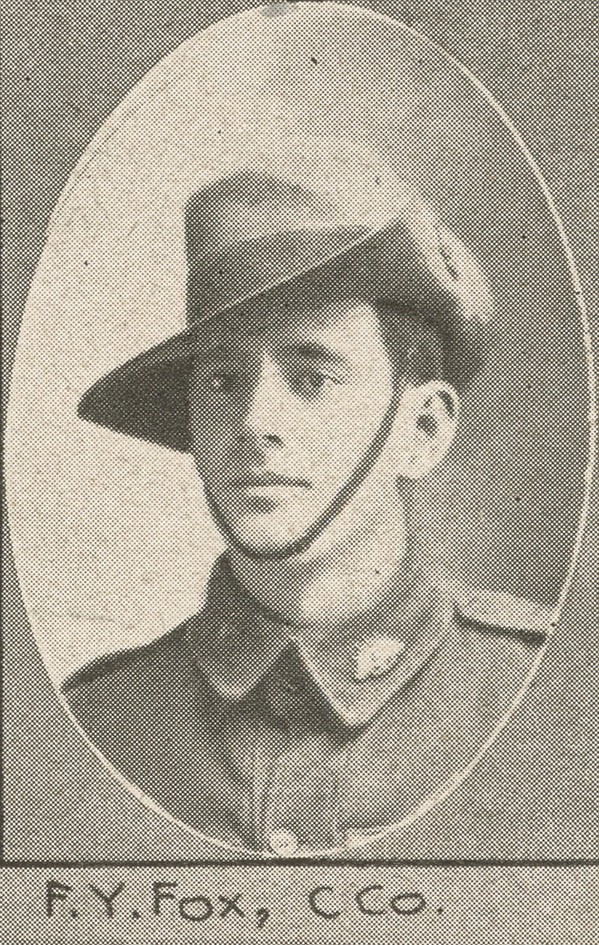Guest Blogger: Victoria Carless 2016 Q ANZAC 100 Fellow

F.Y. Fox, C Co., The Queenslander Pictorial, supplement to The Queenslander, 1914. John Oxley Library, State Library of Queensland.
With the help of SLQ staff, I have been exploring the shadow side of the WWI solider, that of the deserter’s story, one that perhaps sits uneasily outside the ANZAC mythology. Yet apparently “Over 30,000 Australian soldiers were court martialled for AWL or desertion” (De Bellis, 2014: 9)
As my aim for this research project is to write a novel, it is important to find a motivation for my main character to desert. From my reading so far, reasons for desertion may be grouped into three broad considerations: the recruitment of unsuitable troops; shell shock or psychological trauma caused by trench warfare; and perhaps most surprisingly, advancement and even infamy.
In Khaki Crims and Desperadoes, author Russell Robinson identifies that there was a contingent of those enlisted who held prior police records and were of “shadowy credentials”. Well-known names on this “roll of dishonour” include members of Sydney’s razor gang, as well the gangland identities of Squizzy Taylor and Jim Devine (Robinson, 2014: 1).
There are also those who enlisted with the best of intentions, whose desertion might be attributed to environmental factors, most obviously the relentlessness of frontline warfare. Such appears to be the case of Private Herbert John Bartholomew from Gympie. Pt Bartholomew had a history of short term AWL offences however, it wasn’t until he failed to show up at the frontline on November 4, 1917, for the Menin Road battle in Belgium that the issue escalated. While he allegedly answered the pre-dawn rollcall, he was not seen during or after the battle. Military Police caught up with him two weeks later. During the Court Marshall proceedings his commanding officers insisted all troops had been informed they would be going over the line and that Pt Bartholomew’s illegal absenteeism clearly demonstrated his intention to abandon his duty. This took the offender from AWL to desertion territory and his case was held up as an example of the value of the death penalty. The court recommendations concluded: “A few cases of the Death Sentence being carried out would have a very good effect on discipline” (De Bellis, 2014: 134).
In some cases, an act of illegal absenteeism indirectly led to promotion. Captain Fred Fox, son-in-law of the inimitable Annie Wheeler, who maintained correspondence with central Queensland soldiers, actually benefitted from going AWOL. According to this family history written by his son Norman Fox, as a private with the 49th Battalion defending the Suez Canal, Fred received word that his elder brother, Sergeant Norman Fox had been wounded and was hospitalised near Cairo. Unable to get leave to visit, his commanding officers agreed to overlook Fred’s absence while he travelled a day and a night across the desert, though sadly, he arrived too late. His service record makes no mention of his unauthorised leave; his superiors kept their word. The qualities of bravery and determination demonstrated however, did not go unnoticed and Private Fox was soon promoted.
Given the range of desertion narratives uncovered to date, perhaps I should develop a number of key characters through which to present these different experiences. In any case, the SLQ collections have been invaluable in providing context around what otherwise might appear damning information on an individual’s service record. By building our understanding around desertion, hopefully we are able to see the person behind the charge
Further reading:
Dianne De Bellis thesis - Stories of Australian deserters in World War 1
Captain Fred Fox Family History
Private Herbert John Bartholomew
Robinson, R. (2014) Khaki Crims and Desperadoes. Macmillan by Pan Macmillan Australia Pty Ltd: Sydney
Victoria Carless, 2016 Q ANZAC 100 Fellow
Comments
Your email address will not be published.
We welcome relevant, respectful comments.